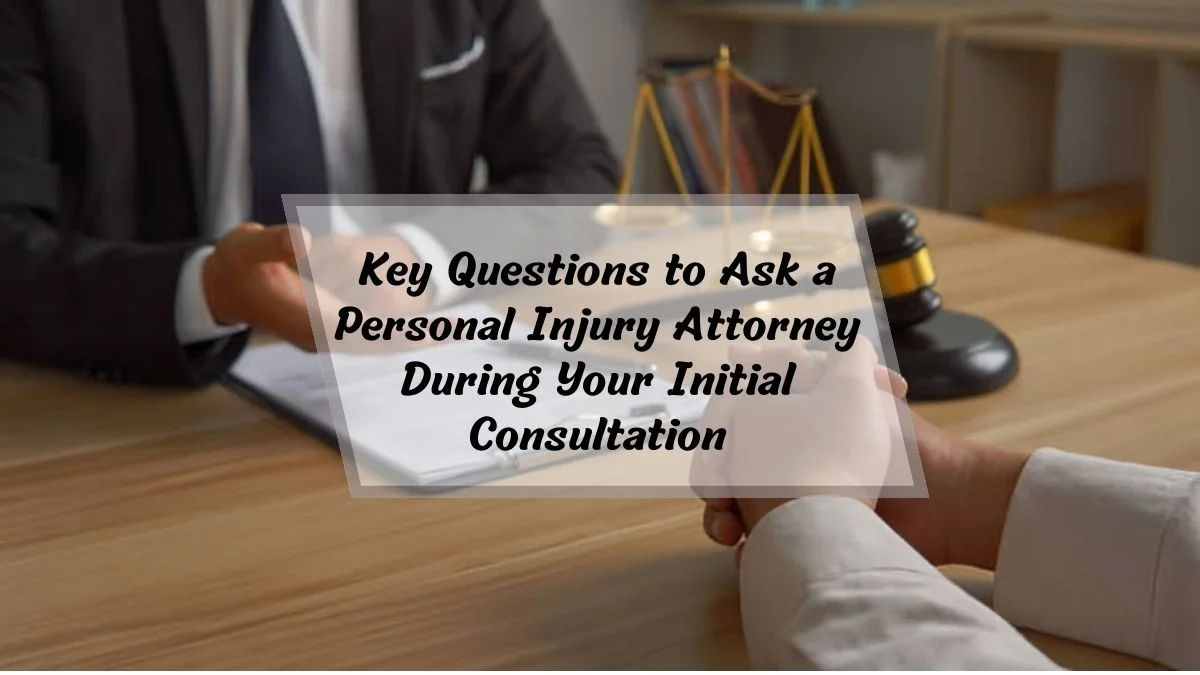LAW
Key Questions to Ask a Personal Injury Attorney During Your Initial Consultation

Introduction
When you’ve been injured in an accident, finding the right attorney is one of the most critical steps in pursuing a personal injury claim. The initial consultation is your opportunity to assess whether an attorney is the right fit for your case.
But what questions should you ask to ensure you’re making the best decision? In this article, we’ll outline the essential questions to ask during your consultation, helping you feel confident and informed as you move forward.
Why the Consultation Matters
The initial consultation sets the tone for your legal journey. It’s your chance to learn about the attorney’s approach, experience, and how they can help with your specific case. At the same time, it allows the attorney to assess the merits of your claim and provide guidance on the next steps.

If you’re in Manhattan Beach or Torrance, working with experienced professionals like Gammill Law ensures you’re well-prepared to tackle the complexities of your personal injury case.
The Questions You Should Ask
To make the most of your consultation, focus on these key areas:
1. Experience and Background
- How many personal injury cases have you handled?
Experience matters, particularly with complex cases involving multiple defendants or nuanced laws. - Do you have experience with cases similar to mine?
Whether it’s a car accident or a slip-and-fall case, an attorney who understands the specific challenges of your type of injury can provide more tailored guidance.
2. Case Strategy
- What is your approach to handling cases like mine?
Some attorneys prioritize early settlements, while others are more aggressive and prepared to go to trial if necessary. - What are the potential challenges in my case?
Understanding the possible hurdles upfront helps set realistic expectations.
3. Fees and Costs
- Do you work on a contingency fee basis?
Most personal injury attorneys don’t charge upfront fees, taking a percentage of the settlement instead. Clarify this during your consultation. - Are there additional costs I should be aware of?
Some firms charge for expenses like filing fees, expert witnesses, or administrative costs.
4. Communication and Availability
- How will we communicate throughout the case?
Determine whether the attorney prefers phone calls, emails, or in-person meetings. - Who will handle my case?
In some firms, paralegals or junior attorneys manage most of the workload. Confirm who will be your primary contact.
5. Timeline
- How long do you estimate my case will take?
While exact timelines are difficult to predict, an experienced attorney can provide a general timeframe based on past cases.
6. Settlement vs. Trial
- What percentage of your cases settle versus go to trial?
This question provides insight into the attorney’s negotiation skills and willingness to pursue a court case if necessary. - If my case goes to trial, what is your success rate?
Trial experience can be crucial for maximizing compensation, especially in disputed cases.
Evaluating the Attorney’s Answers
Pay attention to more than just the content of the answers. Look for:
- Clarity: Are their explanations easy to understand?
- Honesty: Do they provide realistic expectations rather than promising guaranteed results?
- Confidence: Do they seem knowledgeable and capable of handling your case?
Questions Attorneys May Ask You
Remember, the consultation is a two-way conversation. Attorneys will likely ask questions to evaluate your claim, such as:
- When and where did the accident occur?
- What injuries have you sustained?
- Have you received medical treatment?
- Do you have documentation, such as photos, witness statements, or police reports?
Be prepared to provide detailed and honest answers, as this helps the attorney determine the strength of your case.
Red Flags to Watch For
Not all attorneys are created equal. During your consultation, be wary of the following warning signs:
- Overpromising Results: Avoid attorneys who guarantee a specific settlement amount or outcome.
- Lack of Transparency: If they’re vague about fees or timelines, it could signal potential issues down the road.
- Limited Communication: Poor responsiveness during the consultation may indicate how they’ll handle your case.
Benefits of Choosing the Right Attorney
Selecting the right legal representation ensures you have a partner who:
- Advocates for Your Best Interests: They’ll negotiate with insurance companies and fight for fair compensation.
- Handles Legal Complexities: From gathering evidence to filing paperwork, they’ll manage the intricate details of your case.
- Provides Peace of Mind: Knowing an experienced attorney is handling your case allows you to focus on recovery.
For those injured in Manhattan Beach or Torrance, Gammill Law exemplifies these qualities, offering dedicated support throughout the legal process.
Preparing for Your Consultation
To make the most of your meeting, come prepared with:
- A List of Questions: Use the ones outlined above as a starting point.
- Documentation: Bring medical records, accident reports, and any evidence related to your case.
- A Timeline of Events: Write down key details about the accident and your injuries.
Beyond the Consultation
Once you’ve chosen an attorney, the real work begins. Building a strong personal injury case involves:
- Collecting Evidence: Your attorney will gather records, photos, and witness statements to support your claim.
- Negotiating with Insurers: They’ll handle communications with insurance companies to secure a fair settlement.
- Preparing for Trial (if Necessary): If negotiations fail, your attorney will represent you in court to pursue maximum compensation.
Why Legal Expertise Matters
In areas like Manhattan Beach and Torrance, where traffic and pedestrian activity are high, personal injury cases often involve unique challenges. Attorneys with local experience understand these nuances and can craft effective strategies tailored to your situation.
Final Thoughts
The initial consultation is your chance to set the foundation for a successful personal injury claim. By asking the right questions and evaluating the attorney’s responses, you can choose a representative who aligns with your goals and priorities.
If you’ve been injured and are considering legal action, Gammill Law offers experienced guidance to help you navigate every step of the process. Don’t hesitate to reach out for a consultation and take the first step toward securing the compensation you deserve.
Looking for more? We’ve got plenty in store. Click here to keep the good times rolling!
-

 BIOGRAPHY9 months ago
BIOGRAPHY9 months agoBehind the Scenes with Sandra Orlow: An Exclusive Interview
-

 HOME1 year ago
HOME1 year agoDiscovering Insights: A Deep Dive into the //vital-mag.net blog
-

 HOME1 year ago
HOME1 year agoSifangds in Action: Real-Life Applications and Success Stories
-

 BIOGRAPHY1 year ago
BIOGRAPHY1 year agoThe Woman Behind the Comedian: Meet Andrew Santino Wife




























